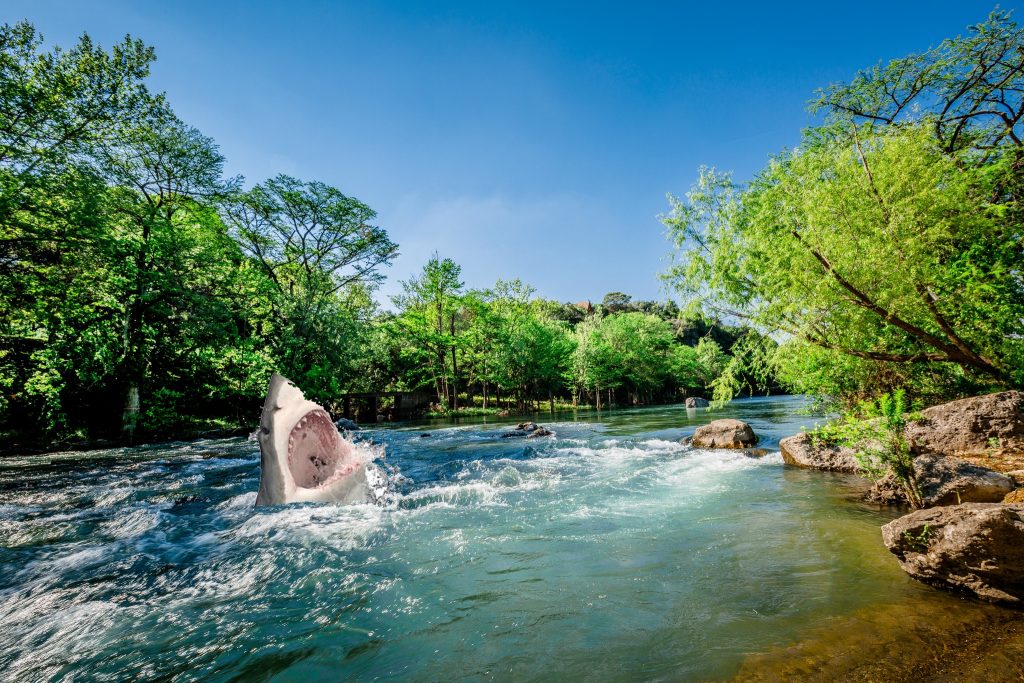Bull Sharks In Guadalupe River: The Untold Story Of The River's Fierce Predators
When you hear the term "bull sharks," your mind probably jumps straight to the ocean, right? But here's a mind-blowing fact—these powerful creatures aren't just limited to saltwater. They've been spotted in some pretty unexpected places, including the Guadalupe River. Yep, you read that right. Bull sharks in Guadalupe River are a real thing, and they're making waves in more ways than one. So, buckle up because we're diving deep into this fascinating phenomenon.
Now, before you start panicking every time you step near a river, let's break it down. Bull sharks are known for their incredible adaptability, allowing them to thrive in both freshwater and saltwater environments. This unique ability has earned them the reputation as one of the most versatile sharks on the planet. And guess what? The Guadalupe River in Texas has become one of their favorite hangouts.
But why are they here? What draws these majestic creatures to a river instead of sticking to the vast ocean? That's exactly what we're here to uncover. So, whether you're a shark enthusiast or just someone who's curious about the mysteries of nature, this article is packed with all the info you need. Let's dive in!
Read also:Neiman Marcus Downtown Dallas Santa Claus A Holiday Tradition You Donrsquot Want To Miss
Table of Contents
- Introduction to Bull Sharks in Guadalupe River
- Biology and Characteristics of Bull Sharks
- Migration Patterns of Bull Sharks
- Why Guadalupe River?
- Impact on the Ecosystem
- Safety Concerns for Humans
- Scientific Research on Bull Sharks
- Conservation Efforts
- Myths vs. Facts About Bull Sharks
- The Future of Bull Sharks in Guadalupe River
Introduction to Bull Sharks in Guadalupe River
Let's set the scene: The Guadalupe River is a picturesque waterway in Texas, known for its lush surroundings and vibrant wildlife. But beneath its calm surface lies a mystery that has intrigued scientists and nature lovers alike—bull sharks. These sharks are no ordinary creatures. They're known for their aggressive nature, powerful build, and, most importantly, their ability to survive in freshwater.
Bull sharks in Guadalupe River have become a topic of fascination for researchers and locals. They're not just passing through; these sharks have been spotted consistently in the river, sparking questions about their behavior and the implications for the local ecosystem. So, how did they get here, and what does it mean for the river's ecosystem?
Why Are Bull Sharks Unique?
Bull sharks are different from other shark species because of their ability to tolerate freshwater. This is due to their advanced osmoregulation system, which allows them to maintain the right balance of salt and water in their bodies. It's like having a built-in survival kit that lets them conquer both saltwater and freshwater environments.
Biology and Characteristics of Bull Sharks
To truly understand the presence of bull sharks in Guadalupe River, we need to take a closer look at their biology. These sharks are built like tanks, with a robust body and a broad, flat head. They can grow up to 11 feet in length and weigh over 500 pounds. But it's not just their size that makes them formidable—it's their attitude.
Bull sharks are known for their aggressive behavior, often described as "angry" or "territorial." This trait, combined with their ability to thrive in freshwater, makes them one of the most adaptable shark species on the planet.
Key Features of Bull Sharks
- Powerful build and aggressive demeanor
- Ability to tolerate freshwater due to osmoregulation
- Highly versatile and adaptable to various environments
Migration Patterns of Bull Sharks
So, how do bull sharks end up in a river like Guadalupe? It all comes down to migration. These sharks are known to travel long distances, often following food sources or seeking out breeding grounds. The Guadalupe River provides a perfect habitat for them, with its warm waters and abundance of prey.
Read also:How Old Is Luke From Outdoor Boys The Untold Story Of A Rising Star
Research has shown that bull sharks can travel hundreds of miles upstream, defying the conventional notion that sharks are strictly ocean-dwelling creatures. This migration pattern has puzzled scientists for years, but recent studies are shedding light on their behavior.
What Drives Their Migration?
- Search for food and breeding opportunities
- Adaptation to changing environmental conditions
- Exploration of new territories
Why Guadalupe River?
The Guadalupe River offers a unique combination of factors that make it an ideal habitat for bull sharks. The river's warm waters, coupled with its connection to the Gulf of Mexico, create a perfect entry point for these sharks. Additionally, the river's rich biodiversity provides ample food sources, making it a prime location for bull sharks to thrive.
But it's not just about the food. The river's calm waters and protected channels offer a safe haven for bull sharks, especially during breeding seasons. This has led to a growing population of bull sharks in the river, much to the surprise of local residents.
Factors That Attract Bull Sharks
- Warm and calm waters
- Abundance of prey
- Safe breeding grounds
Impact on the Ecosystem
The presence of bull sharks in Guadalupe River has a significant impact on the local ecosystem. As top predators, they play a crucial role in maintaining the balance of the food chain. However, their presence can also disrupt the natural order, especially if their numbers grow too large.
Scientists are closely monitoring the situation to ensure that the ecosystem remains healthy and sustainable. This involves studying the interactions between bull sharks and other species in the river, as well as assessing the long-term effects of their presence.
Positive and Negative Effects
- Positive: Maintains balance in the food chain
- Negative: Potential disruption to local wildlife
Safety Concerns for Humans
Now, let's address the elephant in the room—safety. Are bull sharks in Guadalupe River a threat to humans? The short answer is yes, but with a caveat. While bull sharks are known for their aggressive behavior, attacks on humans are relatively rare. Most encounters occur when humans accidentally enter the shark's territory or provoke them.
That being said, it's important for river-goers to be aware of the presence of bull sharks and take necessary precautions. This includes avoiding swimming during dawn or dusk, staying in groups, and keeping a safe distance from any suspected shark activity.
Tips for Staying Safe
- Avoid swimming during peak shark activity times
- Stay in groups and avoid isolated areas
- Keep an eye out for warning signs
Scientific Research on Bull Sharks
Research on bull sharks in Guadalupe River is ongoing, with scientists working tirelessly to understand their behavior and impact on the ecosystem. Studies have revealed fascinating insights into their migration patterns, feeding habits, and social interactions.
One of the key areas of research is the genetic makeup of bull sharks, which may hold the key to understanding their ability to thrive in freshwater. By unraveling these mysteries, scientists hope to gain a better understanding of how to protect both the sharks and the ecosystems they inhabit.
Recent Findings
- Genetic studies reveal unique adaptations
- Migration patterns suggest seasonal behavior
- Feeding habits indicate diverse diet
Conservation Efforts
Conservation is a crucial aspect of managing bull sharks in Guadalupe River. These sharks are listed as near-threatened by the IUCN, making it imperative to protect their populations. Conservation efforts include monitoring their numbers, protecting their habitats, and raising awareness about their importance in the ecosystem.
Local communities and organizations are playing a vital role in these efforts, working together to ensure the survival of bull sharks while minimizing their impact on human activities.
How You Can Help
- Support local conservation initiatives
- Spread awareness about the importance of bull sharks
- Practice responsible river use
Myths vs. Facts About Bull Sharks
There are plenty of myths surrounding bull sharks, many of which paint them as bloodthirsty monsters. But the truth is far more nuanced. Bull sharks are complex creatures with fascinating behaviors and adaptations. Separating fact from fiction is crucial for understanding and appreciating these incredible animals.
For example, while bull sharks are known for their aggressive nature, they're not mindless killing machines. Their aggression is often a result of misinterpretation or provocation. By learning more about their true nature, we can foster a greater appreciation for these misunderstood creatures.
Common Myths
- Myth: Bull sharks are always dangerous
- Fact: Attacks are rare and often avoidable
- Myth: They only live in saltwater
- Fact: They can thrive in freshwater
The Future of Bull Sharks in Guadalupe River
As we look to the future, the presence of bull sharks in Guadalupe River raises important questions about coexistence and conservation. With ongoing research and community involvement, there's hope for a balanced relationship between humans and these magnificent creatures.
The key lies in education and awareness. By understanding the role bull sharks play in the ecosystem and respecting their place in the river, we can ensure a harmonious future for both humans and sharks alike.
Final Thoughts
In conclusion, bull sharks in Guadalupe River are a fascinating phenomenon that highlights the adaptability and resilience of these incredible creatures. While they may seem intimidating, they play a vital role in maintaining the health of the river's ecosystem. So, the next time you hear about bull sharks in Guadalupe River, remember that they're not just there to cause trouble—they're there to thrive.
And hey, don't forget to share this article with your friends and leave a comment below. Let's keep the conversation going and learn more about the amazing world of bull sharks!
Article Recommendations


